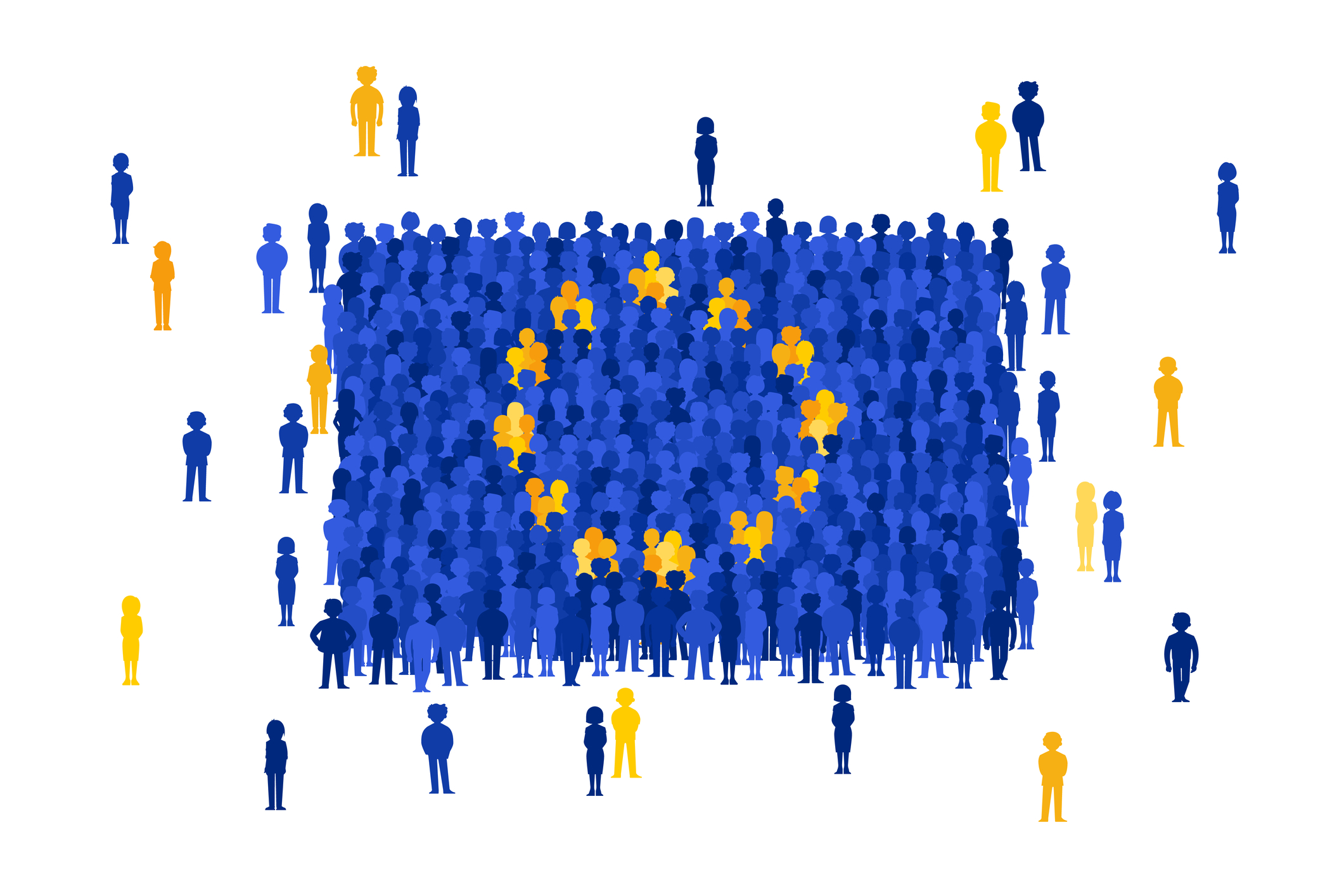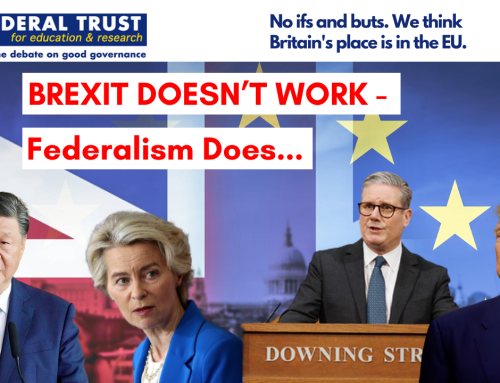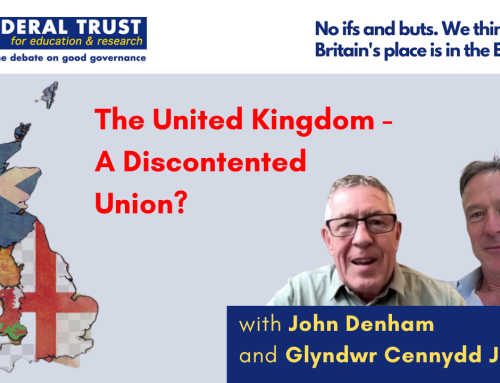Democratic backsliding has become such a defining trend in global politics over the past decades that the democratisation of the European Union has gone largely unnoticed.[1] After the entry into force of the Treaty of Lisbon on 1 December 2009, however, the EU has been advancing its transition from a confederal union of democratic states to a European democracy of states and citizens. The hallmark of the EU in its present form lies in the application of the constitutional principles of democracy and the rule of law to an international organisation. Defying the global trend, the EU is establishing itself as an unprecedented democratic regional polity.[2] US President Biden has acknowledged the EU’s transformation by inviting the Union to participate alongside all but one of its member states in the Summit for Democracy .[3]
Eternal foundation
In the course of its transition the EU has abandoned the Westphalian system of International Relations. The significance of this breakthrough for the theory of global governance can hardly be overestimated, notably because the Westphalian dogma stipulates that the constitutional values of democracy and the rule of law can only thrive within the borders of a sovereign state. In the globally prevailing approach, transnational democracy amounts to a contradiction in terms.
The historical reason as to why this conceptual innovation to place in Europe, is that the old continent formed the theatre of two devastating world wars in the first half of the 20th century. Since the start of the Early Modern Era the states of Europe had been conducting their mutual affairs on the basis of the Westphalian model. The core of this system consists of absolute state sovereignty. In reaction to the feudal mindset of the Middle Ages, philosophers like Bodin emphasized that sovereignty had to be one and indivisible. The very idea that States had to respect a higher authority was perceived as unbearable. Internally, the Sovereign was free to treat his subjects as he pleased, while the ruler was guided in the field of foreign affairs merely by the raison d’ État. In consequence, war was regarded as the continuation of diplomacy with other means. Less than two centuries after its introduction, the Westphalian model was celebrated by Jean-Jacques Rousseau as the eternal foundation of our international system.[4]
After its restauration in the wake of the Napoleonic adventures at the turn of the 17th and 18th centuries, the Westphalian system was regarded by statesmen and theorists alike as the guarantor of the balance of power. The large European states, notably Great Britain, France and Russia, had to control each other’s ambitions in fluctuating partnerships with the Austro-Hungarian Dual Monarchy, the Ottoman Empire and the ‘latecomers’ Germany and Italy. They granted each other their own sphere of influence to the detriment of smaller states like Poland, Ireland and Luxembourg.
The position of the smaller peoples in international law was strengthened, however, by the emerging principle of self-determination.[5] Whereas the Westphalian model makes a sharp distinction between the internal and the external dimension of sovereignty, the right of peoples to govern themselves increasingly gained recognition in the course of the late 19th and the early 20th century. Seen in this perspective, the outcome of the Great War (1914-1918) is particularly striking. The first of the two world wars of the 20th century resulted in the demise of four empires and the rise of numerous smaller sovereign states on the old Continent and in the Middle East. However, both the Treaty of Versailles and the League of Nations failed to address the root causes of war by leaving the principle of absolute sovereignty untouched. Two decades later, Germany broke the balance of power once more and violated the principle of self-determination for the sake of the creation of ‘Lebensraum’ and a ‘Third Reich’.
The legacy of Westphalia
The Organisation of the United Nations, which was founded in 1945 with the view to ‘save succeeding generations from the scourge of war’, reaffirmed the right of self-determination and applied it subsequently in the context of decolonisation. At the same time, the UN accentuated universal faith in human rights and encouraged regional international organisations to promote its values. On the old continent, ten countries established the Council of Europe in 1949 and adopted the European Convention on Human Rights and Fundamental Freedoms in 1950. Promising as these developments appeared to be, they did not meet the demand for no more war, expressed by the peoples of many European countries. The difference between the existing organisations and the European Community for Coal and Steel was that the founding states of the ECSC broke the principle of absolute sovereignty by attributing the exercise of sovereignty over the raw materials required for war to a higher authority. So, European integration started as a deliberate attempt to overcome the constraints of the Westphalian system.[6]
However, contemporary political thinking was to be dominated by the Westphalian approach for decades to come. In line with the artificial distinction between states and international organisations scholars continued to insist that the values of democracy and the rule of law can only come to fruition within a sovereign state. In addition, they argued that the relations between states had to be regarded as a zero sum game and that the gains of one party implied a loss to the other.
The legacy of the Westphalian paradigm caused a paralysing debate in the polity. While all participants in the discussion about ‘the nature of the beast’ wanted the post-war Europe to be democratic, one school of thought located the seat of democracy in the polity per se, while the other school held with equal vigour that the Member States had to be regarded as the natural keepers of democracy.[7] Over the decades, the two opposing schools came to mistrust each other to such an extent that progress could only be made if the end goal of the common effort was not mentioned.[8] In hindsight, the appearance of this ‘paradox of the finalité politique’ is the more perplexing since the drafters of the 1957 Treaty of Rome had consciously chosen to formulate the objective of their endeavour in post-Westphalian terms as ‘to lay the foundations of an ever closer union among the peoples of Europe’.
The Democratisation of the European Union
This state of mind forms an important reason for explaining why post-war scholars and politicians have been unable to observe that the ever growing European polity was evolving in another direction than they had predicted. While customs unions are not uncommon in international law, the finding of the European Court of Justice in 1963 that the Member States had given their Community an ‘autonomous legal order’, could have been perceived as a clear sign that the emerging polity had started to move away from the Westphalian model. The ensuing identification of the Communities as a Union of democratic States served as an encouragement for the Member States to ensure that their polity would also acquire democratic legitimacy of its own.[9] They transformed the existing Parliamentary Assembly into a directly elected Parliament. The first direct elections for the new parliament were held in the spring of 1979, albeit that its members were chosen by the electorates as citizens of the Member States brought together in the Communities. The architecture of European democracy was changed through the foundation of the EU and the introduction of Union citizenship in 1992. Contrary to the demands of the Westphalian system, the new status established a direct link between the Union and its citizens and enabled the citizens to participate in the political life of the Union. The constitutional character of the emerging polity was accentuated through the introduction of the values of the Union by virtue of the 1997 Treaty of Amsterdam. The 2000 Charter of Fundamental Rights of the Union was integrated in the Lisbon Treaty, which came to replace the Constitution for Europe after its rejection in 2005. The Treaty of Lisbon defies Westphalian dogmas by construing the EU as a democracy without turning the Union into a State.
The entry into force of the Lisbon Treaty in December 2009 was followed by an unprecedented series of crises. For almost a decade, the EU was shaking on its foundations and a number of member states raised the question as to whether they should return to the Westphalian concept of national sovereignty. One country decided to withdraw from the EU altogether, while a number of other member states envisaged to reform the Union from within. Poland and Hungary notably rejected the introduction of the rule of law-mechanism in 2020 and argued in a dispute before the EU Court of Justice that the new mechanism amounted to an unwarranted interference by the EU in the internal affairs of sovereign states. The ECJ rejected the utterly Westphalian complaint by establishing that 1) the member states have voluntarily created their Union, 2) have first agreed among themselves on their common values and 3) have subsequently applied these values to their Union.[10] By concluding that the Union must also be able to defend these values within the limits of its competences, the Court put beyond doubt that the EU has abandoned the Westphalian system.
Practical Consequences
This theoretical exercise is indispensable for reaching three practical conclusions. The first one concerns the upcoming 2024 elections for the European Parliament. Until now, the EU is presenting itself as ‘a unique economic and political union between 27 European states’. This self-description does neither contain a reference to the citizens nor to the democratic character of the EU or even to the European Parliament. If the EU wants to encourage the citizens to participate in the political life of the Union – as article 10 TEU prescribes -, it must urgently adapt its communication to its constitutional identity. Prior to the elections, the EU should replace its present self-presentation with a democratic definition like ‘the EU is a union of states and citizens which works as a European democracy.’
The second conclusion is evident in the light of the war between Russia and Ukraine. Far from accommodating Russian aggression,[11] the EU has to defend its constitutional principles in foreign affairs. Commission President Von der Leyen has rightly described the war in terms of a conflict between autocracy and democracy.[12] Hence, the EU has to reinvent itself on the global stage as a democratic regional polity.
Finally, the EU, its High Representative for foreign affairs and security policy and its External Action Service should urgently make an effort to explain the EU’s participation as the only regional organisation in the Summit for Democracy of 29 and 30 March. In view of the intention of the Summit ‘to reaffirm the vitality of the democratic model’, the EU should seize the opportunity for highlighting its evolution from a union of states to a democratic regional polity.
Notes
[1] Democratic backsliding is accentuated inter alia by the Clingendael Spectator series on ‘Democracy under Pressure’. See also: Carnegie Europe: The Reshaping European Democracy Project www.carnegieeurope.eu
[2] J. Hoeksma, The Democratisation of the European Union, The Hague Eleven 2023
[3] Hungary and its self-proclaimed ‘illiberal democratic’ prime minister Orbán have not been invited.
[4] A. Bick, Westphalia: Beyond the Myth, in: After Disruption, Historical Perspective on the Future of International Order, Center for Strategic and International Studies, New York 2020
[5] P.H. Kooijmans, Internationaal publiekrecht, Deventer 2008
[6] Kapteyn & VerLoren van Themaat, The Law of the European Union and the European Communities, Alphen aan den Rijn, Wolters Kluwer 2008
[7] P. Magnette, What is the European Union?, Hampshire Palgrave Macmillan 2006
[8] J. Hoeksma, From Common Market to Common Democracy, Oisterwijk 2016
[9] Declaration on European Identity, EC-Bulletin 1973-12
[10] ECJ. (2022) Cases C 715/17 Parliament and Council v Poland and Hungary. [16 February] ECLI:EU:C:2022:97 and ECLI:EU:C:2022:98
[11] As suggested by U. Guérot and H. Ritz in Russia’s war and the final chance for European integration, Clingendael Spectator 30 November 2022, https://spectator.clingendael.org/en/publication/russias-war-and-final-chance-european-emancipation
[12] State of the Union 2022, https://ec.europa.eu/commission/presscorner/detail/en/speech_22_5493







Leave A Comment